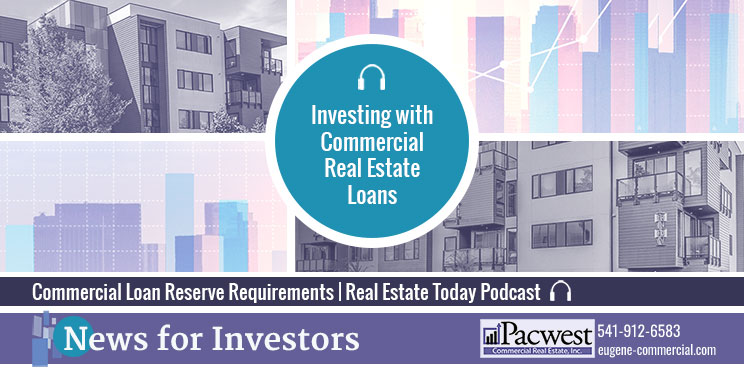
Check out the newest podcast on commercial real estate loans!
Today Isaac and I talk about the changes in lending guidelines due to the pandemic. Listen in as we discuss what to expect for down payments.
Featuring:
René Nelson, Eugene commercial real estate broker
Isaac Grant, Eugene commercial loan officer
Investing with Commercial Real Estate Loans – Part 4
René Nelson: Joining me once again is Isaac Grant from Oregon Community Credit Union. Hey Isaac.
Isaac Grant: Hey René. Pleasure to be here.
René Nelson: Thanks. Okay, so let’s talk about reserves because I know when COVID hit, Fannie Mae and Freddie Mac … those are kind of the money sources … changed the lending guidelines for reserves. Talk to me about that. Okay, so first question. If I wanted to buy a multifamily property, I wanted to buy a 10 unit apartment complex, ballpark me on what it’s going to take for a down payment.
Isaac Grant: Yeah, down payment, René, is one of the primary questions that we receive on a first phone call from an applicant. Everyone wants to know how much is it going to cost me to be able to get into this property up front. Typically, you’re going to be looking at somewhere from a minimum to 25 to 30, 35% cash down. It is a case by case basis dependent upon the net operating income from that property. How much income is that property producing to be able to repay the debt that I’m taking out against it?
René Nelson: Okay. That makes sense. And then talk to me about … Let’s say I have 30% for a down payment. What am I going to need for reserves? What do you want to see?
Isaac Grant: Again, that’s kind of a twofold answer, René. We’re looking at the reserves for the subject property that we’re looking to finance, but also as you spoke about in the show yesterday, we were looking at the personal financial statement. We want to see what other liabilities do you have out there and do you have enough cash reserves for all the debts and all the liabilities that you currently have within your portfolio?
Typically a good range, and again, this is going to depend lender to lender, case by case, property type is going to is going to play … There’s going to be a few different factors, but typically at the moment, most lenders are going to want to see six to 12 months of cash reserves for all of the liabilities that you have within your portfolio.
René Nelson: Okay. Stupid question, but does that include my signature loans and my car loan and my kids’ student loan debt that I co-signed on?
Isaac Grant: Again, case by case basis, but for the purposes of if you’re coming to apply, just assume that most lenders are going to be looking at your complete financial picture, so yes, it is going to include those things.
René Nelson: Okay, so you obviously are going to get your Abacus out and count some money.
Isaac Grant: Yes, absolutely. That’s what we do every day.
René Nelson: Okay. And then quick question, does it have to be liquid or can it be in a 401k or something like that?
Isaac Grant: That’s going to be lender to lender. Typically, we’re going to want to see it liquid.
If you enjoyed listening to the podcast, expert René Nelson is just a 15-minute discovery call away from answering your questions. Give Pacwest a call today.

Recent Comments